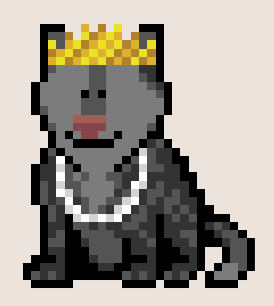




Quick Links:
It’s called Wolf Game for a reason and the reasons are plentiful. Having a wolf provides many advantages in the game:
Depending on the makeup of your Wolf Game bag, some wolf actions may be more advantageous than others. For example, a player with 1 wolf and 1 peak bathhouse has different paths to earn wool than someone else with 1 wolf, 15 Valley land, 8 gen2 sheep, and 4 breeding sheep. The first may try to produce peak credits, while the second may use their wolf to lower taxes significantly and run a more profitable farm.
A key takeaway here: A wolf’s potential to create value is tied to the other game pieces that you surround it with. If you go all in on a wolf, but have no other pieces, you may find yourself in a spot where it’s harder to play the game profitably.
The greatest advantage of a wolf is its ability to produce Peak Credits, which means as credit demand increases, the total value of wolves also increases. Peak credits are used to play Peak Games, you can think of them like tokens needed to play at your favorite arcade.

A single wolf is able to produce 50-80x the amount of peak credits from a sheep. However, remember that total peak credit production is tied to the number of peak bathhouses, having 1 peak bathhouse with 1 wolf gives you a significant production advantage over everyone else.
One thing is very clear - the ceiling for wolves is directly tied to the # of people playing peak. This creates significant opportunity, but it also explains one of the reasons for why wolves have historically been unable to unlock significant value in the game. Wolves are designed specifically to meet the demand for Peak Games.
Raiding barns is a great way to harvest chops in bulk or even steal a Gen2 sheep, but this action doesn't come without risk! A failed raid attempt results in losing lots of precious energy. As sheep are breeding in barns, the breeder can decide to protect the barn with a farmer. If a wolf attacks the barn while the farmer is protecting, then the wolf gets nothing, and loses the energy spent on the raid attempt.
If the wolf raid is successful, then a number of things can happen next:
Looting is a lower risk play, and can be a great way to collect lots of resources. As sheep gather resources on the farm, they become fatter and fatter. At any point of the collection process, a wolf can walk up to an unprotected sheep and play a mini-game which determines how much of the sheeps resources he gets. It’s also important to know that the wolf does not have to pay taxes on these resources, which has a significant impact on the tax production for land owners. Looting your own sheep can provide a serious tax advantage, which we cover more in the Tax Advantage section below.
Wolves can also attack the defenses of any given community. Community defenses are in place to provide more protection for the gathering and breeding sheep. Communities with high defense means the wolves have to spend more energy to raid barns and loot sheep.
Wolf breeding is the most risk free action in the entire game. 2 wolves can breed in Peak Dens, and the offspring are not at risk of being stolen… yet. There is also significant speculation that wolf pelts will eventually be added to the game, which may be the point at which risk is introduced to the wolf breeding process.
Tax advantages significantly impact your ability to play WolfGame profitably. Looting your own sheep allows you to collect resources without paying the landowners tax. This concept is heavily compounded with the daily multiplier effect and farmer protection strategy.
For example, a sheep collecting for 40-60 days can reach levels of 300-500 chops value (equivalent chops value in resources). Looting your own sheep in this scenario will save you 120-200 chops in taxes at the average tax rate of 40%. This is equivalent to 2,000 to 3,700 wool in todays market (about 17 wool per 1 chop).